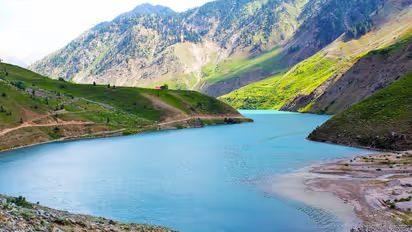Protests rock Pakistan-occupied Kashmir as suffering rises by the day

Synopsis
While Pakistan sinks deeper into economic crisis, the plight of the people of Pakistan-occupied Jammu and Kashmir and Gilgit-Baltistan has increased many folds. Both PoJK and PoGB are suffering from severe shortages of both wheat and electricity. Amjad Ayub Mirza reports
Hundreds of families are starving, and thousands have become unemployed as a result of the closing down of small businesses and workshops. Protests against economic deprivation have been a daily occurrence for almost a year now.
People have braved minus 20-degree celsius temperatures to observe daily sit-ins. Pensioners have not been paid for months in both territories as the treasury has gone dry. Government employees in PoJK have not been paid their salaries for three months.
An attempt to garner support for Pakistan in PoJK-GB by observing February 5 as Kashmir Solidarity Day has also backfired. On the day, protests were held in several cities in which, one after the other, speakers rejected Pakistan's claim that India was mistreating Kashmiris in the union territory.
A comparison of prices of flour, onion, tomatoes, and other daily essentials between the Kashmir Valley and PoJK is the talk of every town and village in PoJK-GB.
The International Monetary Fund (IMF) team has arrived in Pakistan and is dictating Islamabad to make deep cuts into the privileges and perks of the military and bureaucracy. The IMF has asked for an increase in fuel and electricity prices and to raise $6 billion in the next five months and a total of $16 billion in foreign exchange before it presents the next fiscal budget in June this year.
The IMF is demanding these reforms to be made and targets to be achieved for it to release a mere $1.3 billion loan, which the IMF has held back since November last year. As Pakistan's economy is in a freefall, its military has just earned a whopping Rs 40 billion profit from a record sale of fertilizer worth Rs 109 billion by Fauji Fertilizer Company Limited, which is a military business enterprise. Not to mention that its former Army chief, General Qamar Javed Bajwa, had accumulated Rs 12 billion before he retired in November last year.
Millions of dollars worth of lithium and other precious minerals from PoJK-GB are being looted and smuggled into Pakistan daily and are unaccounted for.
Just to give you a perspective of the value of the loot, I must tell you that one truckload of 25 tons of lithium is worth Rs 53 crore. Pakistan is not poor, and neither is PoJK-GB. However, the Military-Mullah-Feudal troika has collectively usurped the land and the minds of its people.
Baloch, Sindhi, Pashtun, and the people of PoJK-GB are living under the barrel of the military gun. No real political or economic rights are allowed to be freely exercised by them. They have been indoctrinated for 75 years that Pakistan was Allah's creation and that 'Hindu' India is their enemy who wants to destroy Pakistan at the first available opportunity.
Under the pretext of Jinnah's communal two-nation theory and the propaganda that what unites all nations occupied Pakistan is the bond of 'Qalma' or faith in Islam, Pakistan's above-mentioned troika has oppressed the people of all nations and exploited their lands. The tide is now changing.
With the Baloch and the Pashtuns up in arms and the people of PoJK-GB out on the streets, Pakistan's troika's control of these oppressed nations is slipping out of its hands.
At the moment, the current economic crisis is moving in one direction only and that is a total collapse. Most of the check posts erected by the Pakistan military in Balochistan and Khyber Pakhtunkhwa provinces are said to have been abandoned by the soldiers. Tensions are high between Pakistan and neighbouring Afghanistan.
China is abandoning project after project in PoJK-GB for non-payment of services and materials provided by Chinese companies.
The political crisis also deepened to the level of the pre-1971 war when the Pakistan military began operation Blue Star in east Pakistan to crush the mandate of the Awami League, which had won most seats in the National Assembly a year before. A 13-party dysfunctional coalition is running the country.
Under the current scenario, it is very much possible that the Balkanization of Pakistan could take place, thus freeing all oppressed nations.
However, in order to achieve liberation from Pakistan, all stakeholders, including the oppressed people of PoJK-GB, Balochistan, Sindh, Khyber Pakhtunkhwa, have to be bang on the beat, and that can only become possible if they form a collective warring alliance.
The author is a human rights activist from Mirpur in PoJK. He currently lives in exile in the UK
This article originally appeared in AwazTheVoice, and has been reproduced with explicit permission